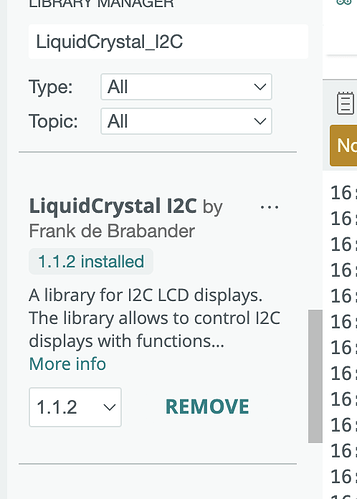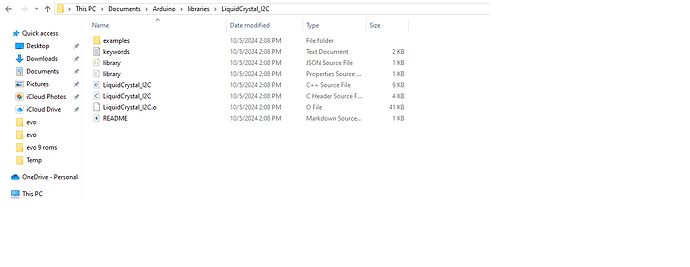I'm sure this is more so just an issue with me being unfamiliar with the software, but it also seems to be an issue with the guide I'm using being outdated with broken links. I built ethanol content sensor converters using a few online guides. The converters work fine with certain code, however, I wanted an easy way to bench test them so I purchased an I2C LCD used in the guides and now I'm having issues getting the screen to work. I get an error:
C:\Users\tye\AppData\Local\Temp.arduinoIDE-unsaved202495-11884-bifiyo.fa586\sketch_oct5a\sketch_oct5a.ino:9:10: fatal error: LCD.h: No such file or directory
#include <LCD.h>
^~~~~~~
compilation terminated.
exit status 1
Compilation error: LCD.h: No such file or directory
This seems to be a common error due to library issues and unfortunately the link to the library that was used for this guide is broken. I've gone through a bunch of different fixes in an attempt to get this working and I think at this point I've overwhelmed myself with information.
/************************************************** *****
This program will sample a 50-150hz signal depending on ethanol
content, and output a 0-5V signal via PWM.
The LCD will display ethanol content, hz input, mv output, fuel temp
************************************************** ******/
// include the library code:
#include <Wire.h>
#include <LCD.h>
#include <LiquidCrystal_I2C.h>
#define I2C_ADDR 0x27 // <<- Add your address here.
#define Rs_pin 0
#define Rw_pin 1
#define En_pin 2
#define BACKLIGHT_PIN 3
#define D4_pin 4
#define D5_pin 5
#define D6_pin 6
#define D7_pin 7
LiquidCrystal_I2C lcd(0x27,En_pin,Rw_pin,Rs_pin,D4_pin,D5_pin,D6_pin ,D7_pin);
int inpPin = 8; //define input pin to 8
int outPin = 11; //define PWM output, possible pins with LCD and 32khz freq. are 3 and 11 (UNO)
//Define global variables
volatile uint16_t revTick; //Ticks per revolution
uint16_t pwm_output = 0; //integer for storing PWM value (0-255 value)
int HZ; //unsigned 16bit integer for storing HZ input
int ethanol = 0; //Store ethanol percentage here
float expectedv; //store expected voltage here - range for typical GM sensors is usually 0.5-4.5v
uint16_t voltage = 0; //Store display millivoltage here (0-5000)
int duty; //Duty cycle (0.0-100.0)
float period; //Store period time here (eg.0.0025 s)
float temperature = 0; //Store fuel temperature here
int fahr = 0;
int cels = 0;
static long highTime = 0;
static long lowTime = 0;
static long tempPulse;
void setupTimer() // setup timer1
{
TCCR1A = 0; // normal mode
TCCR1B = 132; // (10000100) Falling edge trigger, Timer = CPU Clock/256, noise cancellation on
TCCR1C = 0; // normal mode
TIMSK1 = 33; // (00100001) Input capture and overflow interupts enabled
TCNT1 = 0; // start from 0
}
ISR(TIMER1_CAPT_vect) // PULSE DETECTED! (interrupt automatically triggered, not called by main program)
{
revTick = ICR1; // save duration of last revolution
TCNT1 = 0; // restart timer for next revolution
}
ISR(TIMER1_OVF_vect) // counter overflow/timeout
{ revTick = 0; } // Ticks per second = 0
void setup()
{
Serial.begin(9600);
pinMode(inpPin,INPUT);
setPwmFrequency(outPin,1); //Modify frequency on PWM output
setupTimer();
// set up the LCD's number of columns and rows:
lcd.begin(16, 2);
lcd.setBacklightPin(3,POSITIVE);
lcd.setBacklight(HIGH);
// Initial screen formatting
lcd.setCursor(1, 0);
lcd.print("Ethanol: %");
lcd.setCursor(0, 1);
lcd.print(" Hz F");
}
void loop()
{
getfueltemp(inpPin); //read fuel temp from input duty cycle
if (revTick > 0) // Avoid dividing by zero, sample in the HZ
{HZ = 62200 / revTick;} // 3456000ticks per minute, 57600 per second
else
{HZ = 0;} //needs real sensor test to determine correct tickrate
//calculate ethanol percentage
if (HZ > 50) // Avoid dividing by zero
{ethanol = (HZ-50);}
else
{ethanol = 0;}
if (ethanol > 99) // Avoid overflow in PWM
{ethanol = 99;}
expectedv = ((((HZ-50.0)*0.01)*4)+0.5);
//Screen calculations
pwm_output = 1.11 * (255 * (expectedv/5.0)); //calculate output PWM for NEMU
lcd.setCursor(12, 0);
lcd.print(ethanol);
lcd.setCursor(2, 1);
lcd.print(HZ);
lcd.setCursor(12, 1);
lcd.print(fahr); //Use this for celsius
//PWM output
analogWrite(outPin, pwm_output); //write the PWM value to output pin
delay(1000); //make screen more easily readable by not updating it too often
Serial.println(ethanol);
Serial.println(pwm_output);
Serial.println(expectedv);
Serial.println(HZ);
delay(1000);
}
void getfueltemp(int inpPin) { //read fuel temp
tempPulse = pulseIn(inpPin, LOW, 25000); // Measure the low pulse time (timeout after 25ms if no pulse is detected)
if (tempPulse > 0) { // If we get a pulse then update the temperature measurement
lowTime = tempPulse;
float celsius = ((41.25 * (float(lowTime) / 1000)) - 81.25); // Calculate temp in celsius from lowTime pulse
float fahrenheit = ((celsius * 1.8) + 32); // Convert to fahrenheit
temperature = fahrenheit; // Update temperature with specified unit
}
}
duty = ((100*(highTime/(double (lowTime+highTime))))); //Calculate duty cycle (integer extra decimal)
float T = (float(1.0/float(HZ))); //Calculate total period time
float period = float(100-duty)*T; //Calculate the active period time (100-duty)*T
float temp2 = float(10) * float(period); //Convert ms to whole number
temperature = ((40.25 * temp2)-81.25); //Calculate temperature for display (1ms = -40, 5ms = 80)
int cels = int(temperature);
cels = cels*0.1;
float fahrtemp = ((temperature*1.8)+32);
fahr = fahrtemp*0.1;
}
void setPwmFrequency(int pin, int divisor) { //This code snippet raises the timers linked to the PWM outputs
byte mode; //This way the PWM frequency can be raised or lowered. Prescaler of 1 sets PWM output to 32KHz (pin 3, 11)
if(pin == 5 || pin == 6 || pin == 9 || pin == 10) {
switch(divisor) {
case 1: mode = 0x01; break;
case 8: mode = 0x02; break;
case 64: mode = 0x03; break;
case 256: mode = 0x04; break;
case 1024: mode = 0x05; break;
default: return;
}
if(pin == 5 || pin == 6) {
TCCR0B = TCCR0B & 0b11111000 | mode;
} else {
TCCR1B = TCCR1B & 0b11111000 | mode;
}
} else if(pin == 3 || pin == 11) {
switch(divisor) {
case 1: mode = 0x01; break;
case 8: mode = 0x02; break;
case 32: mode = 0x03; break;
case 64: mode = 0x04; break;
case 128: mode = 0x05; break;
case 256: mode = 0x06; break;
case 1024: mode = 0x7; break;
default: return;
}
TCCR2B = TCCR2B & 0b11111000 | mode;
}
}
This is the code being used, I've downloaded probably 40 different libraries and I'm sure this is just an issue with the way I'm doing something but maybe someone else can walk me through this. I did run a couple of the library examples such as the hello world and those work fine. My address for the LCD is correct at 0x27, what am I missing aside from obviously this code isn't compiling and the LCD.h properly. Thanks for the help!



